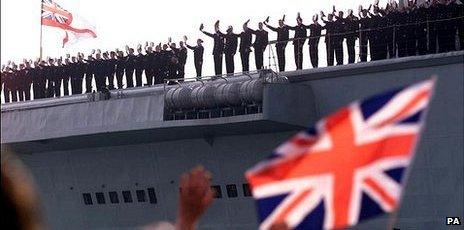Jubilees show UK's declining ability to protect itself
- Published
- comments

The latest round of defence cuts involves 3,800 redundancies, and it is clear from the Ministry of Defence's figures, external that just under one third of those going have been given no choice in the matter.
The department stressed on Tuesday that these figures are part of previously announced plans to reduce the armed forces by 17,000, but it is worth looking at the decline in the UK armed forces over the longer term.
Since we are fresh from the Diamond Jubilee celebrations, and the Thames River pageant it is worth reminding ourselves of what has been lost since the 1977 Silver Jubilee.
As a young man, I bought myself a ticket on the Isle of Wight ferry, and sailed through the lines of warships at anchor in the Solent - there were lines of Leander class frigates, 'O' class diesel submarines, and minesweepers.
When it came to foreign representation, a couple of countries sent aircraft carriers and others a destroyer. Back in 1977 New Zealand sent a frigate - this time a Maori canoe to paddle up the Thames; the UK is not on its own in this.
Feeling the pain
At the Silver Jubilee, the Royal Navy had 69 destroyers and frigates, now it has 19. There were 76,200 serving in the Senior Service whereas today it is 34,000. Of course the RAF has been hit hard too, with a force of combat aircraft about one quarter of the size that it was back in 1977, and the Army has lost two thirds of its tanks.
In this latest round of cuts, the Army has received most attention, because its strength is now falling from around 100,000 a few years ago to 82,000 in the near future. There is plenty of pain involved in this, of course, for people who thought they had a career in the forces but are now being asked to leave, air bases closed, or famous regiments disbanded.
While many professional soldiers feel that an Army with the five brigades, the force established under the Coalition government's Strategic Defence and Security Review (the SDSR), has sunk below a critical level, I would argue that they have probably got off the lightest of the three services.
As we shift from Jubilee to Olympic mode, the fragility of the UK's home defences is striking:
The UK has no defence against missile attack (unlike Japan, several Gulf states and Israel); no long range anti-aircraft missiles (they went 30 years ago); no diesel submarines able to protect the home islands (these were scrapped in the 1990s); only enough minesweepers to keep one of its major ports open; no long range maritime patrol aircraft (binned in the SDSR); there is frequently no frigate or destroyer available for home defence; and the number of RAF interceptors that are fully operational is barely adequate.
Niche skills
Of course the UK can still rain nuclear destruction with Trident missiles, sustain a deployment of several thousand troops overseas or one of two dozen or so combat aircraft. Its capabilities in this last respect have eroded even since last year's Libyan operation.
The MoD can still offer certain niche capabilities that foreign allies - principally the US - still value, but these can be counted on the fingers of one hand, including special forces, precision bombing, and minesweepers.
But oddly, the UK has retained some capability to "project power" in far corners of the world at the precise moment that the political will to do so has collapsed, because of the long wars in Iraq and Afghanistan.
At this time, in this summer in which Britain itself is the focus of a major "Op Olympic" effort, the really striking thing is how diminished the capability to protect the country itself is.
Changing threats
Now of course it can be argued that Britain is not directly threatened by any of its neighbours and that defence is a hugely expensive thing to maintain in times of austerity.
Equally though it should be apparent that the world is less stable than it was, say at the time of that 1977 fleet review, and that the ability of the UK or the Western family of nations more widely, to shape world events is sharply diminished.
These days it is China that is stepping up defence spending, and the United Arab Emirates is set to field more advanced combat aircraft than the RAF.
While many have pointed to the political consequences of the global recession, for example in feeding nationalism or extremism, and some have drawn parallels with the 1930s, nobody is yet advocating that there be rearmament.
Indeed, in asking Tornado crews to bomb Libya while the force of these aircraft was being cut, or soldiers to patrol in Helmand when their regiments may be shrinking, the tension between austerity and trying to retain some kind of military role in an unstable world could hardly be starker.